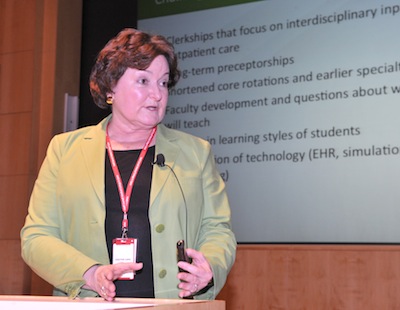Simulation-based learning revolutionizing medical education
February, 2015

Visiting expert Dr. Deborah Sutherland, CEO of the University
of South Florida Center for Advanced Medical Learning and
Simulation (CAMLS)
The ways in which simulation-based learning methods are changing medical education were explored at a special lecture given by a visiting expert in the field.
Dr. Deborah Sutherland, CEO of the University of South Florida Center for Advanced Medical Learning and Simulation, told an audience of students and healthcare professionals about the opportunities and challenges posed by the increasing use of simulation-based teaching methods in medical education.
Simulation-based learning uses artificially contrived scenarios and, frequently, specialist technology such as anatomical models and computer-generated images to allow medical students and healthcare professionals to develop practical skills in a safe environment. Simulation-based learning can remove the need to learn skills by practicing on living patients, which reduces the risk of injury and improves learning outcomes by creating a less stressful learning environment and allowing techniques to be practiced repeatedly under close supervision.
Dr. Sutherland’s lecture, entitled ‘The Changing Paradigm of Medical Education: The Role of Simulation-Based Learning’, explained that the new teaching method has begun to change the way medicine is taught.
She said: “The proliferation of simulation-based learning activities represents a critical shift in the medical education paradigm. A definite movement is underway from the traditional apprenticeship model that has been used for centuries to a model that has a competency-based approach at its core, and the way in which competency is being ensured is largely through simulation-based learning and assessment.”
Held at WCMC-Q, the lecture was organized by the Division of Continuing Professional Development in collaboration with the Dean’s Office. Dr. Sutherland, who is also Associate Vice President of the University of South Florida Health and Associate Dean of the Morsani College of Medicine, is visiting Doha as part of a delegation of specialist advisors who are working with WCMC-Q to discuss the evolution of the college’s Clinical Skills Center.
Dr. Robert Crone, Senior Advisor to the Dean on Academic Affairs at WCMC-Q, said: “Dr. Sutherland is a recognized expert in her field and our audience members were clearly very interested to hear her thoughts about the ways in which simulation-based learning can benefit both students and healthcare professionals undergoing training as part of their continuing professional development, and how this can ultimately lead to improved healthcare outcomes for patients.”
The University of South Florida Center for Advanced Medical Learning and Simulation, known as CAMLS, is based in a three-story, 90,000 square foot building in Tampa and is one of the world’s foremost medical simulation and training facilities. Dr. Sutherland gave the placement of a central-venous catheter as an example of the type of procedure that the facility can simulate. The procedure entails insertion of a catheter into a vein near the heart by threading it through a large vein in the arm, chest or neck.
She said: “Placement of the central-venous catheter has been identified as one of the top ten most erroneously performed medical procedures in the United States. CAMLS is addressing this by offering a course that allows medical professionals to learn the correct procedure for placing the central line using ultrasound in a safe, controlled environment, which has clear benefits for both the medical professional and the patient.”
Dr. Javaid Sheikh, Dean of WCMC-Q, said: “Simulation-based learning has emerged as an incredibly useful tool for training medical students to perform a very wide variety of critical skills in a safe environment under close observation by faculty. At WCMC-Q we have embraced the opportunities offered by simulation-based learning in our state-of-the-art Clinical Skills Center and we are excited by the potential for developing our capacity even further.”
